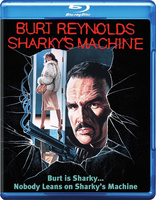Sharky's Machine Blu-ray Movie
HomeSharky's Machine Blu-ray Movie 
Warner Bros. | 1981 | 122 min | Rated R | Apr 07, 2015Movie rating
6.7 | / 10 |
Blu-ray rating
| Users | 3.3 | |
| Reviewer | 3.5 | |
| Overall | 3.3 |
Overview
Sharky's Machine (1981)
Tom Sharky is a narcotics cop in Atlanta who's demoted to vice after a botched bust. There Sharky stumbles across a mob murder with government ties, and organizes his downtrodden fellow investigators (Sharky's "machine") to find the leaders and bring them to justice.
Starring: Burt Reynolds, Vittorio Gassman, Brian Keith, Charles Durning, Earl HollimanDirector: Burt Reynolds
| Crime | Uncertain |
| Drama | Uncertain |
| Action | Uncertain |
Specifications
Video
Video codec: MPEG-4 AVC
Video resolution: 1080p
Aspect ratio: 1.78:1
Original aspect ratio: 1.85:1
Audio
English: DTS-HD Master Audio 5.1 (48kHz, 24-bit)
German: Dolby Digital Mono
Spanish: Dolby Digital Mono
Japanese: Dolby Digital Mono
Japanese is hidden
Subtitles
English SDH, French, German SDH, Japanese, Spanish
Discs
50GB Blu-ray Disc
Single disc (1 BD)
Playback
Region free
Review
Rating summary
| Movie | 3.5 | |
| Video | 4.0 | |
| Audio | 4.0 | |
| Extras | 0.5 | |
| Overall | 3.5 |
Sharky's Machine Blu-ray Movie Review
Slow but Still Running
Reviewed by Michael Reuben March 31, 2015It may be hard for anyone who wasn't there at the time to appreciate just how huge a movie star Burt Reynolds was during the 1970s and early 1980s. Until he was hobbled by a serious injury during the making of 1984's City Heat, Reynolds was a versatile and reliable box office draw, whether in serious dramatic roles like Deliverance (1972), raucous comedies like Smokey and the Bandit (1977), which spawned two sequels, or mixtures of the two like his tribute to stuntmen, Hooper. (He also did a Western, The Man Who Loved Cat Dancing, and a musical, The Best Little Whorehouse in Texas.) Reynolds directed four feature films during this period, of which by far the most successful was the 1981 crime drama, Sharky's Machine, based on the freshman novel by author William Diehl. With a screenplay by Gerald Di Pego (Phenomenon), the film is a distinctive blend of police procedural, film noir tropes and a few elements that suggest David Lynch's surreal juxtaposition of the sexualized world of crime with the innocence of childhood. Add in some memorable stunt sequences (one of which still holds the record for highest wireless free fall), and you have a film unlike anything a major studio would release today. Reynolds was attracted to Sharky's Machine because of a key plot device that Diehl borrowed (consciously or not) from Reynolds' favorite film, a classic from the Forties that I don't want to name for fear of spoilers. When he was unable to get his Deliverance director, John Boorman, to helm the project, Reynolds took on the job at Boorman's suggestion. Some of the star's casting choices were inspired. Above all, he was able to interest the great Italian actor, Vittorio Gassman (Sleepers), who rarely worked in America, in playing the ruthless and charismatic Victor, an international sex trafficker with his eye on even bigger prizes.
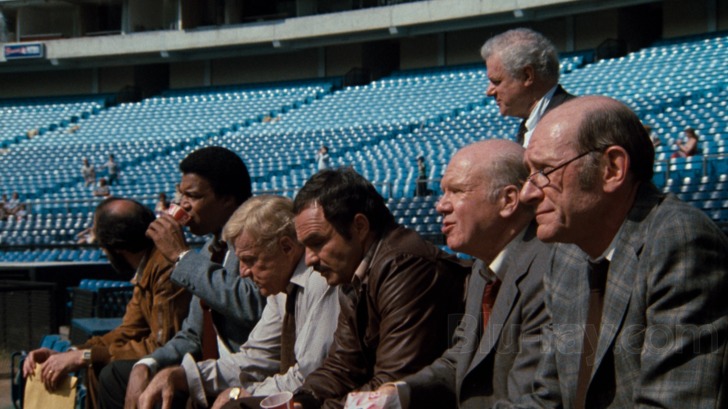
The setting is Atlanta, where author William Diehl was a photographer and journalist until, at the age of fifty, he began writing novels. Sharky's Machine was shot on location, which gives the film a gritty realism, even as the plot grows increasingly outlandish. Atlanta P.D. Sgt. Tom Sharky (Reynolds) is a decorated narcotics detective who, in an elaborately choreographed opening sequence, has an undercover bust go bad. As punishment, Sharky must say goodbye to his fellow narco cops JoJo (Joseph Mascolo) and Smiley (Darryl Hickman) and accept reassignment to the cesspool of the vice squad. The commander is Lt. Friscoe (Charles Durning), who insists that no one "make waves". Following their lieutenant's lead, vice detectives take neither their job nor themselves seriously. At the moment, the assignment of Papa (Brian Keith) and Arch (Bernie Casey) is to keep hookers off the streets during campaign stops by the leading candidate for Georgia governor, Donald Hotchkins (Earl Holliman). But the squad's attitude changes when one of their own turns up dead. Det. Ted Roper (Val Avery) is shot, execution-style, while in the company of an expensive call girl (Suzee Pai, who will be familiar to fans of Big Trouble in Little China as the green-eyed Miao Yin). Although the cops don't know it, the assassin is an eccentric, drug-fueled ghost named Billy Score, who is played by Henry Silva, one of the great specialists in screen villains (he was Chunjin in the original Manchurian Candidate). Evidence from the Roper crime scene leads to an exceptionally expensive call girl known as Dominoe (Rachel Ward), on whose high-rise apartment Sharky establishes round-the-clock surveillance with the assistance of his best friend, an electronics wizard known as "Nosh" (Richard Libertini). And the waiting begins. Sharky's observation of Dominoe is as much Vertigo as police investigation, as he gradually falls in love with the woman he's watching. Or is it love? In the words of Dominoe's puppetmaster, Victor (Gassman), Dominoe's "art" is to create the illusion of love. Every man thinks he's in love with her and she with him, which is why Victor finds her so valuable. She has been one of Victor's most useful tools in expanding his criminal empire from Europe, where he began as a sex trafficker, into America, where he is reaching into drugs and political corruption. As Sharky watches, however, Victor's plans hit a snag, and he must once again call upon the services of Billy Score, endangering many lives, including those of Sharky and the "machine" of vice detectives newly energized by his presence. Further casualties occur, as Sharky and Victor speed toward an inevitable confrontation that ultimately seems more about personal vengeance than law enforcement. One of the most interesting features of Sharky's Machine is how little it shows for an R-rated film. But it feels sordid and depraved, which is a function both of the performances and of the peculiarity of the relationships. Gassman's Victor exudes the sinister confidence of a man who has made his fortune by exploiting people in the most intimate and seductive fashion, then discarding them casually (and fatally) when they no longer serve him. Ward's Dominoe has the surface confidence of a practiced manipulator, but the surface covers an empty shell (or maybe something worse). Reynolds' Sharky has the intensity that made his Lewis in Deliverance so fascinating, but he also has something else inside him that comes out while he watches Dominoe—and, as any student of Hitchcock knows, relationships that begin in voyeurism rarely go well. On the surface, Reynolds' Sharkey is a classic hard-boiled cop with a soft center, but there's more to him. The film pauses during its third act to explore Sharkey's emotions—I can't be more specific without spoilers—and, to Reynolds' credit as a director, it isn't always a pretty picture.
Sharky's Machine Blu-ray Movie, Video Quality 
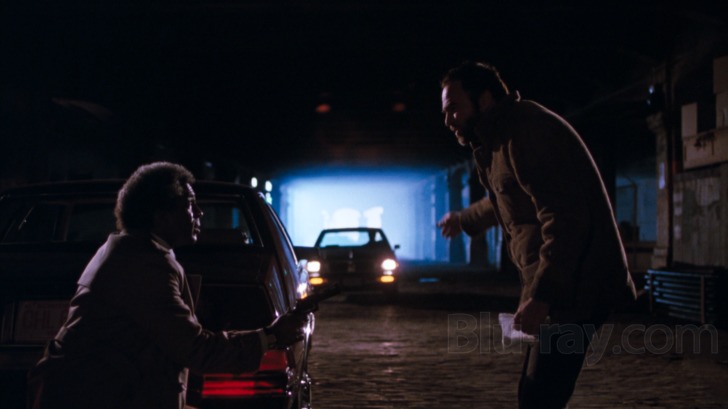
Sharky's Machine was shot by the distinguished cinematographer William A. Fraker (Rosemary's Baby), but it has not been treated well on home video until now. Warner's 1998 DVD was reformatted from its theatrical aspect ratio to 1.33:1 and was generally underwhelming. At 1.78:1, Warner's 1080p, AVC-encoded Blu-ray is close to the original aspect ratio and has been taken from a much more recent image capture harvested from source materials in excellent condition. The Blu-ray provides an impressive reproduction of Fraker's stylized photography, which draws heavily from film noir in its use of shadows, windows, curtains, rain or simply dark surroundings to obscure the image. Fraker has spoken in interviews of the education he received working with Roman Polanski, and Polanski's influence is evident in the many shots where the viewer has to share Sharky's perspective, as he strains to make out what is happening in the mysterious world of Dominoe and Victor that he is trying to penetrate. In scenes where the image isn't being underlit, filtered or blocked (e.g., the scene at baseball practice where Lt. Friscoe gets a progress report), sharpness and detail are very good, which suggests that the slight fall-off of detail in other scenes is a deliberate result of Fraker's photography. An obvious example is an extended sequence on a boat, where much of the frame is black with patches of blue illumination; only portions of faces and figures are meant to be visible (and with good reason). Colors are vivid and saturated, which makes Sharky's Machine a time capsule of late Seventies bad taste, particularly in Dominoe's apartment, where the production design is so deliberately overdone that the eye is overwhelmed. Equally vivid is the Atlanta skyline, especially the distinctive tower of the Peachtree Plaza Hotel, which serves as Dominoe's apartment building. Blacks are solid throughout, which is essential in the opening drug bust sequence, as well as the scenes at the vice squad headquarters. Warner has placed Sharky's Machine on a BD-50, but aimed for its usual average bitrate in the mid-twenties, specifically 24.95 Mbps. As a result, the total disc image is only 27.1 GB. No artifacts leapt out, but Warner Home Video's "good enough" philosophy makes no sense when so much digital real estate remains unused. I have been told privately that Warner is re-evaluating its approach; so things may change later this year.
Sharky's Machine Blu-ray Movie, Audio Quality 
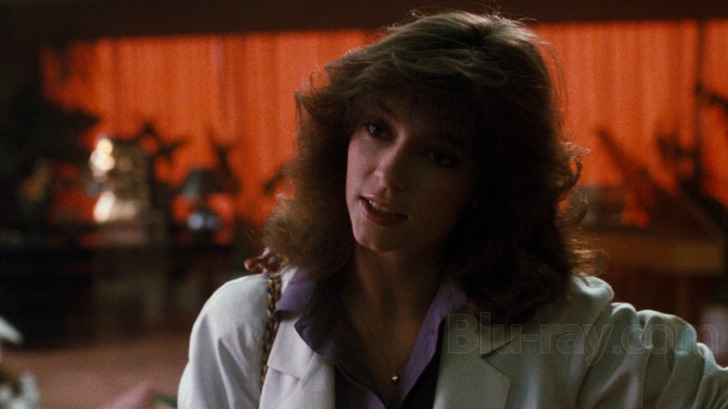
Sharky's Machine was released in Dolby Stereo, and Warner's 1998 DVD had a stereo track in Dolby Digital. For Blu-ray, the soundtrack has been remixed for 5.1 and encoded in lossless DTS-HD MA. The results are quite good. The film's soundtrack featured a jazzy amalgamation of instrumentals and pop standards involving a myriad of professionals including Tonight Show band leader Doc Severinsen, Al Capps and Snuff Garrett. The film opens with a newly recorded version of "Street Life" by the Crusaders and Randy Crawford, and songs like "My Funny Valentine" (both instrumental and sung by Chet Baker and Julie London) play an integral part in the story. Sarah Vaughan and Joe Williams sing the closing number, "Before You", over the end credits. All of these recordings sound very good, with clear stereo separation and an open and airy sense of presence, thanks to the rear channels. The dialogue is clear and well-defined, and key sound effects, notably gunfire and breaking glass, register with sufficient impact to make their point.
Sharky's Machine Blu-ray Movie, Special Features and Extras 
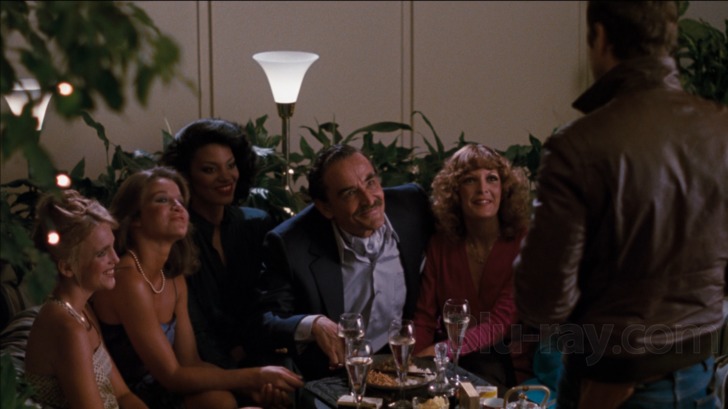
Except for the film's trailer (480i; 1.33:1; 1:53), the disc has no extras. Note that the sound drops out for a moment, midway through the trailer, during a line by Brian Keith. I recall that HBO ran a promotional featurette on the film's stunts when it played in theaters, but it does not seem to have survived.
Sharky's Machine Blu-ray Movie, Overall Score and Recommendation 
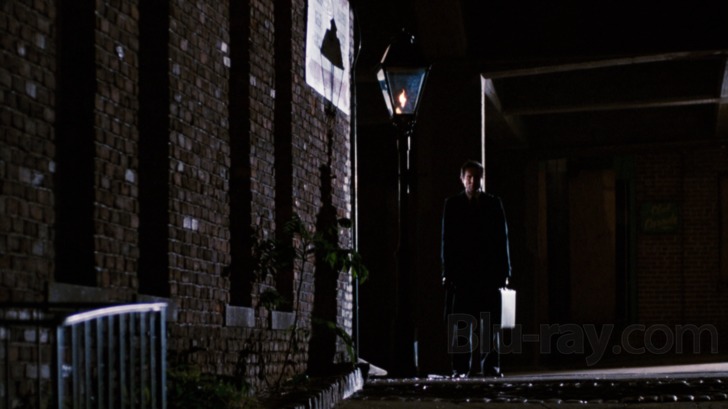
By today's standards, Sharky's Machine moves at a languorous pace. Contemporary editors would insist on cutting it down by about twenty minutes, and contemporary directors probably would not linger on actors' faces as Reynolds did. But they wouldn't get the same kind of performances, either. Reynolds may have been making mainstream box office fare, but he was doing so at a time when American cinema was dominated by innovators who were redefining the medium in ways that still influence filmmaking today. Reynolds was no more immune to what was happening around him than anyone else in the industry, which is one of many reasons why Sharky's Machine remains an interesting film. It took a while, but Warner has finally given it a good video presentation, though the lack of extras is disappointing. Recommended.
Similar titles
Similar titles you might also like

Magnum, P.I.: The Complete Series
1980-1988

Ripper Street: Season Four
2015

McQ
1974

Renegades
Retro VHS Collection
1989

Starsky and Hutch: Complete Series - Seasons 1 - 4
1975-1979

The Gauntlet
Reissue
1977

Bullets or Ballots
1936

The Rockford Files: The Complete Series
1974-1980

Q & A
1990

Vice Squad
4K Restoration
1982

Death Warrant
1990

A Force of One
2K Restoration
1979

Walker, Texas Ranger
1993-2001

The Equalizer: The Complete Series
1985-1989

Nighthawks
Collector's Edition
1981

Gator
Special Edition
1976

Woman of Straw
1964

Running Scared
Special Edition
1986

Tightrope
1984

Best Seller
1987
